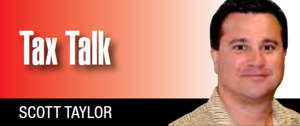This, of course, is the time of year for gathering up slips and receipts in advance of preparing your 2018 federal income tax return. If you’re a self-employed individual, any taxes you owe are due by April 30 even though the deadline for filing your return is June 15. Corporate returns are due no later than six months after the end of the business’s tax year.
February is also a time for tax advice. I don’t know anyone who enjoys the process of prepping a tax return (as an accountant, I’m grateful for that). But there are steps you can take to make it easier and less stressful. Here’s where to start:
Download your logbook data
If you haven’t downloaded your 2018 electronic logbook data, please stop reading this and do it now.
Ready? Okay. Welcome back.
A logbook serves two purposes. On one hand, it’s an hours-of-service record that you’re required to keep for six months. On the other, it’s a tax document if you claim meals as a deduction on your tax return. That means, like other receipts and supporting information, you need to keep your logbook data for seven years.
If you’re using an electronic log, your records exist on a server somewhere managed by an ELD provider or your carrier. As far as they’re concerned, this data for HOS compliance and can be purged as soon as six months are up.
So please secure your ELD records before they are gone forever. Set up a reminder to download them at the start of each month. If a CRA auditor asks for your logbook data and you don’t have it, your meal deduction will be denied.
Separate your personal and business life
Maintaining the distinction between business and personal finances is one of the biggest challenges any owner-operator will face. If I can give you one piece of advice, it’s to have separate accounts for business and personal income and expenses.
|
A logbook is a tax document if you claim meals as a deduction on your tax return. That means you need to keep your logbook data for seven years.
|
Having separate bank and credit card accounts will help you keep your records straight. Besides, do you really want your bookkeeper or accountant having to sort through your personal expenses?
What about a CRA auditor?
Mixing personal and business finances is a huge red flag at CRA because it can indicate tax fraud. Every year, the agency publishes a long list of tax-related convictions and most involve the use of business income and expenses for personal gain. Recent cases include a Quebec company that falsely claimed more than $276,000 in expenses related to the renovation of the owner’s personal homes, and an HVAC contractor in B.C. who cashed more than 100 checks payable to his business at a payday loan company instead of depositing them into the business’s bank accounts.
You may be as honest as the day is long. But whenever your personal and business lives come into contact, both are open to scrutiny.
Prepare early
Don’t be the client who shows up three days before a deadline. First, you’re not the accountant’s only client – there are others who are way ahead of you. Second, your return may get done on time but with virtually no margin for you or your accountant to catch mistakes and omissions.
If you prepare your return early and owe more money than you expected, you’ll have time to make your payment before additional interest and penalties kick in. And if you don’t owe money, you’ll get your refund sooner.
Hire reputable help
At the risk of sounding self-serving, here’s another piece of advice that’s worth repeating: use a reputable accountant and tax preparer.
You should expect the same thing from your accountant that your customers expect from you – competence, professionalism, communication, and the feeling that you are important.
A good accountant may cost more. But when you hire a pro who knows you and your business, and you’re in touch throughout the year, together you’ll find tax savings that more than make up for the fees.
Scott Taylor is vice-president of TFS Group, providing accounting, bookkeeping, tax return preparation, and other business services for owner/operators.
Learn more at www.tfsgroup.com or call 800-461-5970.
